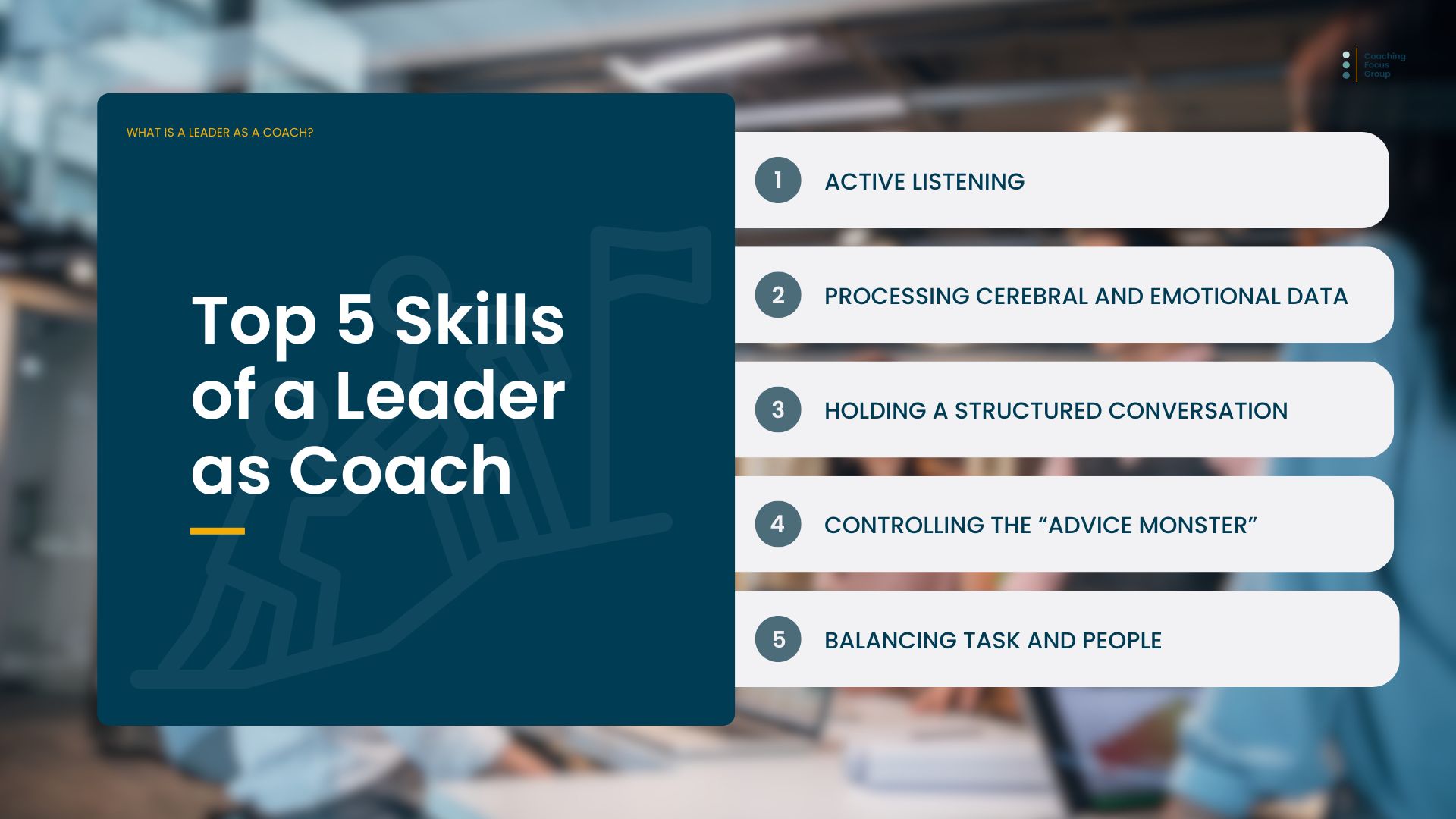What is a Leader as a Coach?

The world of work has shifted. The old hierarchy, full of instruction and compliance, no longer takes us far. We’re moving into an era defined by connection, collaboration, and conversations that really matter. That shift ushers in a new kind of leadership - the Leader as Coach.
Rather than defaulting to management, leaders must pull on their coaching cap. That switch - moving from directing to engaging, fixing to asking -is tougher than it sounds. We’ve been wired to manage, to control. Yet, that very wiring fuels cultures of command - and dampens innovation, trust, and ownership.
What organisations truly need now is something deeper. A humancentric way of leading. A more connected and collaborative approach. When leaders step into their coaching role as a reflex, the entire DNA of leadership transforms.
A Leader as Coach isn’t just skilled in setting direction - they hold effective conversations that matter. They listen, process both the facts and the feelings, and guide with purpose and clarity. These conversations spark movement, growth, and real transformation.
Top 5 Skills of a Leader as a Coach
- Active Listening
Not just hearing - but being fully present. No distractions. No fixing. Just presence. - Processing Cerebral and Emotional Data
Great leaders’ sense what’s unsaid. They grasp the tone behind the words and detect feelings behind ideas. Empathy meets insight here. - Holding a Structured Conversation
With a beginning, middle, and end. Every coaching conversation flows with purpose and clarity. - Controlling the “Advice Monster”
The urge to fix is real. But often, the answers already lie within the other person. Coaching helps them discover that. - Balancing Task and People
Goals matter - but not at the cost of the human achieving them. Coaching holds both in equal measure.

Evidence: Why This Works — and Pays
Scientific numbers back this style of leadership.
- 788% ROI on executive coaching—driven by jumps in productivity and employee satisfaction. WIRED+1A.J. O'Connor Associates+4Luisa Zhou+4Kapable+4
- Industry averages show 5 to 7 times return on coaching investment, depending on study. A.J. O'Connor Associates+3SparkEffect+3coaching-focus.com+3
- One Fortune 1000 study saw 5.7× ROI, with returns often between US$100K and US$1M per executive coaching initiative. The Times+15SparkEffect+15Luisa Zhou+15
- 86% of organisations report a positive ROI from leadership coaching. Wikipedia+10skylineg.com+10Kapable+10
- A surge in revenue: 51% of companies with strong coaching cultures outperform their peers. newlevelwork.com+10Luisa Zhou+10coaching-focus.com+10
- A global survey found 19% achieved 50× ROI (5000%), and 28% saw 10–49× return. Median return: around 700% (7×). newlevelwork.com+4 coaching-focus.com+4SparkEffect+4
- Additional gains in retention, performance, and satisfaction: 50% jump in team performance, 48% gain in organisational performance, and clearer communication. American University
These aren’t just abstract numbers. They translate into real people feeling seen, more energy at work, higher retention, and teams that deliver.
ROI in Everyday Terms
- Boosted productivity and retention repay the investment many times over - often within a year.
- Stronger engagement: A coaching approach creates trust, loyalty, and deeper motivation.
- Better team and organisational performance: Structured coaching conversations lead to clarity, alignment, and inspired action.
Leadership is no longer about hoarding answers. It’s about creating space for others to discover theirs. The Leader as Coach is the guide, not the commander - listening, uncovering insight, and igniting growth. That isn’t just the future of leadership - it’s the most effective kind of leadership.
Talk to us about our Leader as Coach skills programme or explore more here
FAQs About a Leader as a Coach
1. What does it mean to be a Leader as Coach?
It means leading through conversations that unlock insight and growth — not just giving instructions. Leaders act more like coaches, asking the right questions and listening deeply to help others discover solutions.
2. How is coaching different from managing?
Managing often focuses on control and direction. Coaching focuses on empowerment, clarity, and ownership. It’s not about having the answers — it’s about helping others find theirs.
3. Why is this style of leadership important right now?
Today’s workplace demands adaptability, collaboration, and trust. Coaching creates the conditions for those things to thrive — especially in hybrid, fast-moving, and high-pressure environments.
4. What are the top skills of a Leader as Coach?
The key skills include active listening, emotional insight, structured conversations, resisting the urge to “fix,” and balancing people and performance needs.
5. What’s the business case for Leader as Coach?
Studies show up to 788% ROI from coaching-based leadership, with gains in performance, engagement, communication, and retention. It’s not just effective — it’s profitable.
6. Can any leader become a coaching-style leader?
Yes. While it takes practice and mindset shifts, coaching is a learnable skill. With training and consistency, any leader can adopt this powerful approach.
7. What’s one simple way to start coaching more?
Start by listening longer before speaking. Ask open-ended questions like “What do you think would work?” and resist jumping in with advice. That small shift changes everything.
Summary: What Is a Leader as a Coach?
The workplace has changed — and leadership must change with it. The “Leader as a Coach” model offers a human-centric, conversation-driven approach that prioritises connection over command. Instead of telling people what to do, coaching leaders listen, ask better questions, and guide others to uncover their own insights. The result? Stronger trust, smarter decisions, higher engagement — and measurable ROI.
Coaching-style leadership isn’t soft. It’s strategic. It boosts productivity, retention, and performance — and builds the kind of culture where people and business both thrive.
Trayton Vance
Trayton Vance is the Founder and Managing Director of Coaching Focus Group, one of the UK’s leading leadership coaching consultancies. With over two decades of experience, Trayton helps organisations build coaching cultures that unlock potential, drive engagement, and create lasting impact.
Coaching Focus Group
Specialists in leadership coaching, workplace coaching programmes, and building coaching cultures that stick.
[FREE WEBINAR]
Thu, Jan 22, 2026, 12:00 PM (GMT)
.jpg)
You might be interested in...



Employee Engagement Series

.jpg)









